Pompeo Says Biden’s Iran Policy Harmed Mideast Stability
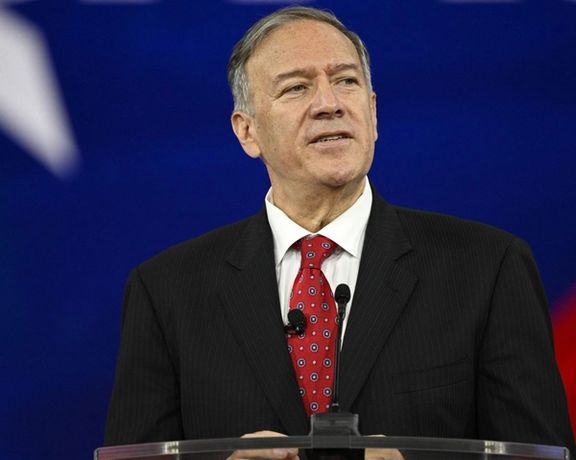
Former US Secretary of State Mike Pompeo says President Joe Biden has thrown out stability in the Middle East by negotiating to make a new nuclear deal with Iran.

Former US Secretary of State Mike Pompeo says President Joe Biden has thrown out stability in the Middle East by negotiating to make a new nuclear deal with Iran.
While the Biden administration is hoping to “appease” Iran, it is possible that the Iranians could shut down the Strait of Hormuz and drive energy prices even higher, he said while enumerating challenges currently facing the administration ahead of Biden’s visit to Saudi Arabia, which is reportedly aimed at reducing skyrocketing gas prices and confront Iran’s nuclear weapons program.
Pompeo criticized Biden’s energy policy to fill the need for more oil and gas in the market from foreign sources, saying that instead of energy producers within the US, “they started with the Iranians and the Venezuelans and now have moved to the Saudis.” “American energy is the right place to start”, he added
"When you side with the Iranians, when you side with the world’s largest state sponsor of terrorism, against Israel, and against Saudi Arabia, and against the Emirates, the leaders of those countries no longer have confidence in the United States, and the chance that they’re going to do a solid for Joe Biden is exceedingly low," he said.
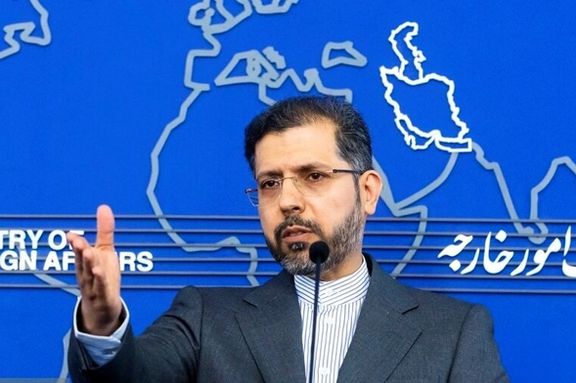
Tehran blamed Washington Monday for lack of progress in talks to revive the 2015 nuclear deal saying it is ready to resume negotiation to achieve a “good deal”.
"Even today, we are ready to return to Vienna to reach a good deal if Washington fulfils its commitments," foreign ministry spokesman Saeed Khatibzadeh said at his weekly televized news conference.
But a good deal for Iran means something very different from what the US says is possible. Year-long talks stalled in Vienna in March, reportedly because of Iran’s insistence to remove its Revolutionary Guard (IRGC) from the US list of Foreign Terrorist Organization (FTO).
The Biden Administration that came to office with a promise to restore the Obama-era Joint Comprehensive Plan of Action or JCPOA, says that it is ready to lift nuclear-related sanctions imposed by its predecessor and does not want to discuss “extraneous issues,” meaning sanctions imposed by the Trump administration over support for terrorism or other violations by Iran and Iranian entities.
Washington says it has made its final proposal to Tehran and awaits its decision. Even the Russian negotiator in the talks, Mikhail Ulyanov, says that 99 percent of all issues were resolved in Vienna before the negotiations stopped.
Middle East Eye reported on Sunday that Iran has dropped its demand for delisting the IRGC, “but has called for lifting of sanctions imposed by the US against Khatam-al Anbiya Central Headquarters,” the economic empire of the IRGC, which itself is implicated in IRGC's terrorism role.
If such a proposal has indeed been made by Iran, it does not appear that Washington is ready to entertain it. Last week, the State Department once again rejected the introduction of issues “extraneous” to the JCPOA.
The administration’s diplomatic approach toward Iran has come under questioning by Republicans and some Democrats who believe no concessions should be made to Tehran. The White House has recently appeared a bit more confrontational with Iran, imposing new sanctions on companies and individuals accused of helping Tehran to circumvent US sanctions.
Iran’s nuclear policy and indeed foreign policy is under the full control of Supreme Leader Ali Khamenei whose important pillar of support is the IRGC amid popular discontent and constant protests.
Khatibzadeh speaking about the achievements of the foreign ministry on Monday said, “The foreign ministry dedicated efforts to the lifting of sanctions. The foreign ministry has been the instrument of higher entities.” The term ‘higher entities’, in the Islamic Republic jargon, usually refers to the Supreme Leader and governmental bodies he controls, such as the Supreme National Security Council.
Speaking about President Joe Biden’s upcoming trip to the region, Khatibzadeh warned the United States and other countries “not to fall in a path designed” by Israel, which is most concerned about Tehran’s nuclear program and has vowed to stop its possible weaponization at any cost.
Iran’s efforts to improve ties with regional Arab countries which are also concerned about its nuclear, military and foreign policies, have not made much progress.
Khatibzadeh, speaking about diplomatic contacts with Saudi Arabia, the dominant Sunni power in the region, said it would be premature for Iran and Saudi Arabia to speak of reopening their embassies in each other's capitals, after they cut relation in early 2016.
Saudi Arabia, which has had cool relations with the Biden Administration is expected to use the president’s trip to change that.
"It is too early to talk about the reopening of embassies by Tehran and Riyadh," Khatibzadeh said, signalling that Iran’s relative isolation will continue.
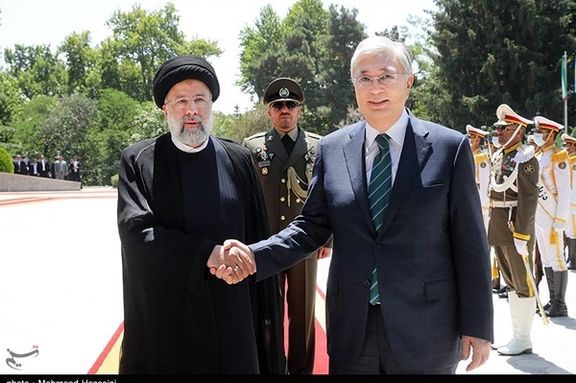
Kazakhstan's president arrived in Iran June 19 at the head of a high-ranking delegation to hold talks with his counterpart Ebrahim Raisi on issues of mutual interest.
Kassym-Jomart Tokayev, who came to Iran at the invitation of his Iranian counterpart, was welcomed by Raisi at Saad Abad palace on Sunday, which follows several other foreign visits to Tehran in recent weeks in a what could be a determined effort to show that the Islamic |Republic is not isolated internationally.
Iran’s state media said that officials from the two countries signed nine Memoranda of Understanding (MoUs) on transit and transportation, scientific and cultural exchanges, agriculture and other fields in a session overseen by the presidents.
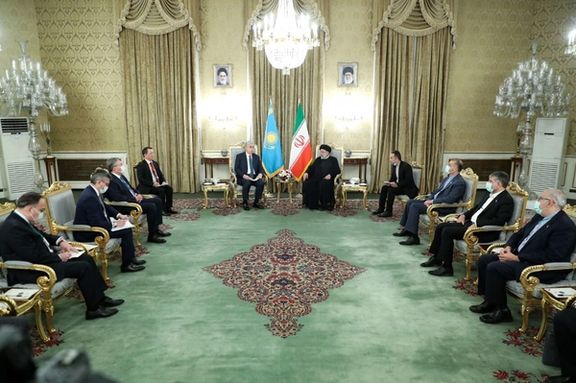
Speaking in a joint press conference with his Kazakh counterpart after the signing ceremony, Raisi claimed bilateral trade ties have increased in recent months, adding that the volume of transactions should reach $3 billion, which sounds far-fetched given the current figure of about $265 million according to the country’s customs administration.
Just recently, Raisi welcomed Turkmenistan’s new President Serdar Berdimuhamedow and signed documents for bilateral economic cooperation, and a day earlier, Pakistani Foreign Minister Bilawal Bhutto Zardari was in Iran to bolster ties.
The Raisi administration has promulgated once and again that its foreign policy is focused on expanding relations with neighbors, a policy hailed by the Supreme Leader.
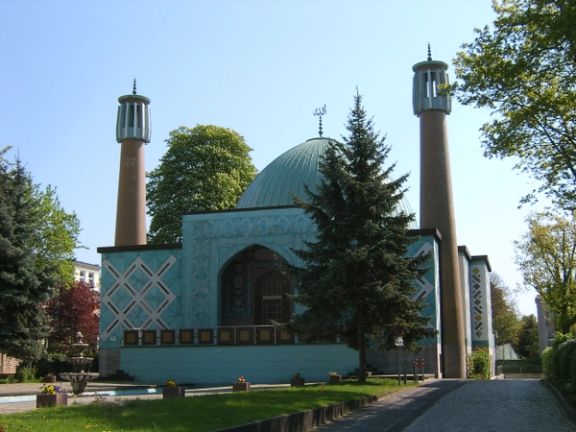
Germany has expelled an Iranian cleric who was the deputy head of the Islamic Center in Hamburg (IZH) from the country for his support for Shiite extremist and terrorist organizations.
According to a report by German newspaper Hamburger Morgenpost on Friday, Soleiman Mousavifar was served with a so-called expulsion order and has to leave Germany immediately or he will face deportation to his home country Iran.
In addition, an entry and residence ban was also imposed on him and if he violates the ban, he can face up to three years in prison.
According to the German authorities, Mousavifar, who shared Shiite extremist propaganda videos on Facebook, supports militant and terrorist organizations and has maintained links to two fundraising organizations working for Iran-backed Hezbollah – banned in Germany -- as well as close contacts with its representatives in Lebanon.
A Senator in Hamburg, Andy Grote told the "Bild" newspaper that "Anyone who demonstrably supports terrorist organizations or terrorist financiers represents a serious threat to our security. From my point of view, the immediate consequence could only be expulsion."
Earlier in the year, the Hamburg Shura Council -- an association of Muslim organizations that represents around 40 mosque communities and other Islamic institutions in the city -- removed the IZH from its board of directors for allegations that the center is Iran’s “long terrorist arm” in Europe.
In July, the German Office for the Protection of the Constitution also found evidence that the head of the IZH – known as Iran’s most “important propaganda center" -- Mohammad Hadi Mofatteh, is himself a member of the Revolutionary Guards.
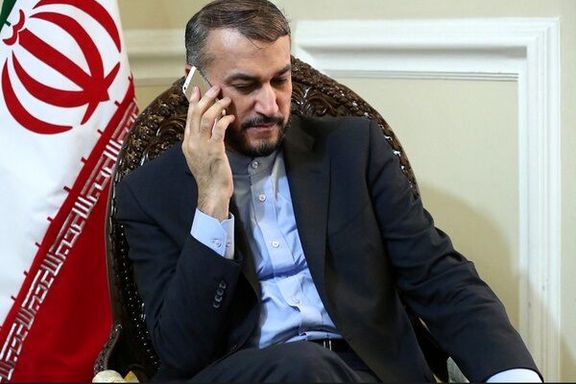
The Iranian foreign minister criticized the US for "the counterproductive and hasty" move over the resolution passed by the International Atomic Energy Agency's Board of Governors.
In a phone conversation with European Union foreign policy chief Josep Borrell on Saturday, Hossein Amir-Abdollahian said “in order to reach a good and lasting agreement, it is necessary for the other side to give up its double standards and contradictory behavior."
He added that the Islamic Republic still believes that "diplomacy is the best and most appropriate" solution to the outstanding issues on the revival of the deal,” reiterating that "Iran has never distanced itself from the negotiating table.”
“If the United States wants to continue its unconstructive behavior, it will face our proportionate response," Amir-Abdollahian emphasized.
The resolution called on Iran to engage with the IAEA without delay and expressed “profound concern” at Iran’s failure to satisfy the agency over traces of uranium found at three undeclared sites and highlighted earlier in June in a report by IAEA Director General Rafael Grossi.
The resolution came as year-long talks paused since March between Iran and five world powers aimed at reviving the 2015 Iran nuclear deal, the JCPOA (Joint Comprehensive Plan of Action).
Following the resolution, Iran retaliated, telling the IAEA it plans to remove more monitoring equipment, but intends to maintain a basic level of monitoring and inspectors’ access as required under the Nuclear Non-Proliferation Treaty (NPT).
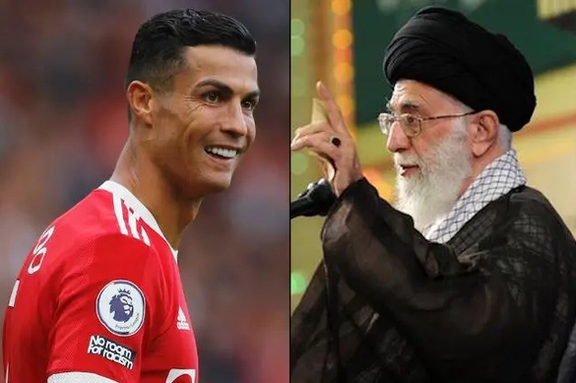
Iran’s state broadcaster has put a false voiceover on a video of Portuguese football star Cristiano Ronaldo, attributing hate speech about Israeli fans to him.
In the video, originally published in 2016 in support of the Syrian children suffering in the country’s civil war, what Ronaldo really says is calling on the kids not to lose hope. “I am a very famous player but you are the true heroes.”
In the version the IRIB broadcast, Ronaldo’s voice is dubbed in Persian as saying that he cannot tolerate the Israeli spectators as they are the most hated for him, adding that he does not exchange his jersey with assassins. The Islamic Republic’s state channel also referred to a hoax back in 2013 as true, that falsely claimed Ronaldo refused to exchange his t-shirt with an Israeli player after a match with its national football team.
In Reality, the video showed a Portuguese player who had swapped his shirt with an Israeli player walking past Ronaldo, but some anti-Israeli media reported it as if Ronaldo refused to exchange his shirt. The Portuguese player is easily recognized from the dark colored shorts he is wearing.
The state broadcaster aired the fake video about a month after Supreme Leader Ali Khamenei criticized Ronaldo’s fame among students in Iranian schools. Khamenei compared Ronaldo with an Iranian scientist, Saeed Kazemi Ashtiani, the head of Iran’s Royan Infertility Research Center who died in 2006, saying that students know Ronaldo but not Ashtiani.